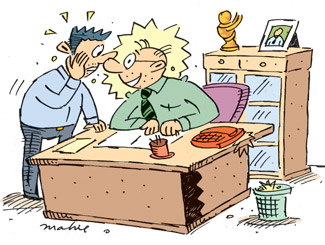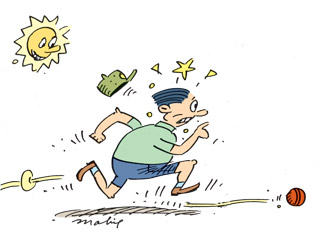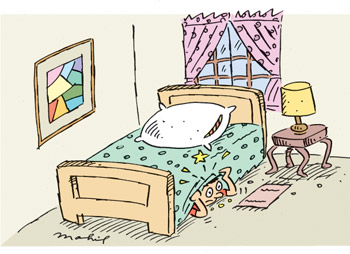|

by R. S. Karunaratne
Use 'thing'
meaningfully
The simple word 'thing' can be used as a countable noun. Its plural
is 'things'.
1. 'Thing' is used to state an opinion.
|

The important thing is not
to carry tales to the boss.
|
It's not a nice thing to criticise others in their absence.
What a stupid thing you've done!
2. 'Thing' is used to comment on, or evaluate an action or behaviour.
It's a good thing that we didn't buy those shirts.
It was a lucky thing you checked your bag.
What a nice thing you've bought me!
3. 'Thing' is used to give advice or to recommend something.
The important thing is not to worry.
The best thing is to drink a lot of water.
This is a nice thing to carry wherever you go.
4. 'Thing' is used to talk about one part or aspect of an event.
The hardest thing is to find a job.
The dumb thing always forgets to bring his season ticket.
The easiest thing is to go abroad to earn money.
5. 'Thing' is used to introduce a point of view or an opinion.
The good thing about Sri Lanka is that you can visit any place
without difficulty.
The funny thing is, there's nobody in office today!
6. Collocations
Certain adjectives often go with 'thing'.
The good thing about walking is that it is a very cheap form of
exercise.
The best thing in this town is that you can buy anything.
|

The funny thing about
cricket is that you have to run after a ball!
|
The bad thing about this place is that there are no toilets.
The worst thing about swimming is that you can't enjoy it when you
are ill.
The nice thing about Shyama is that she doesn't lose her temper.
The funny thing about cricket is that you have to run after a ball!
The strange thing about politics is that there are no permanent
friends or enemies.
The main thing is not to worry!
The important thing is not to carry tales to the boss.
The last thing I expect from you is loyalty.
Certain verbs are frequently used with 'things'.
I have to think over these things before making a final decision.
Let's discuss things before we migrate.
We're going to sort things out with them.
Unless we speed things up we can't reach there on time.
7. Set phrases
We haven't taken down a thing during his lecture. (not anything)
I can't see a thing from here. (not anything)
A: Aren't you coming with me?
B: The thing is , I have to meet a friend. (giving an explanation)
A: Why do you like Sri Lanka?
B: Well, for one thing, the people are friendly. (one of possible
reasons)
My father collects old books and things. (similar things)
He does teaching, writing and that sort of thing. (expanding a
category)
Apply some balm. It's just the thing for a headache.
---------
[Electric words]
Here's a quiz to increase your word power. Indicate the word or words
nearest in manning to the keyword in the sentences. Check your answers
with the key.
1. I Saw the baleful look on the robber's face.
(a) deadly
(b) sad
(c) happy
2. Although our boss sometimes sounds bellicose, he is actually very
kind.
(a) stupid
(b) quarrelsome
(c) pleasant
3. She overlooked his bilious remarks because she knew that he was
bad tempered.
(a) good
(b) stupid
(c) bitter
4. In his bumptious fashion, Peter thought everybody would look at
him.
(a) arrogant
(b) latest
(c) old
5. She did not like her teacher's captious remarks.
(a) endearing
(b) critical
(c) courageous
6. Some of our team members behaved in a churlish fashion.
(a) childish
(b) childlike
(c) boorish
7. We enjoyed the convivial atmosphere at the book exhibition
(a) festive
(b) dark
(c) bright
8. Even the most craven animal will turn courageous when its young
are threatened.
(a) brave
(b) cowardly
(c) foolish
9. He impressed everybody with his debonair appearance.
(a) flashy
(b) dirty
(c) gracious
10. Most teledramas have lachrymose themes.
(a) sad
(b) happy
(c) funny
****
Key
1 a, 2. b, 3. c, 4. a, 5. b,
6. c 7. a, 8. b, 9. c, 10. a.
*****
Starters :
Adjectives
We form some adjectives from verbs by adding 'ing' or 'ed' endings to
them. Adjectives that end in 'ing' have different meanings from those
ending in 'ed'.
'Anna Karenina' is an exciting novel.
We read the shocking news in the 'Daily News' yesterday.
He jumped off a moving train.
|

The frightened boy hid under the bed. |
His face was simply frightening.
It was a boring lecture.
'Knight rider' is a thrilling telefilm.
This book is very confusing.
The meal was quite satisfying.
It was a touching scene where a child said 'goodbye' to his mother.
The pleasing atmosphere of the hotel attracted many tourists.
Don't make such embarrassing remarks.
Adjectives ending in 'ed'.
The frightened boy hid under the bed.
The excited children ran to the notice board to see their examination
results.
The terrified woman screamed when she saw the burglar.
The teacher was pleased with my work.
The nurse gave some water to the tired patient.
You can expect satisfied customers to come to your shop once again.
The exhausted workers hurriedly cleared up the auditorium.
A worried mother phoned the principal to check if her child had
attended school.
The stunned child stood open-mouthed as the motorcycle stopped inches
away from him.
The astonished viewers looked at the pictures of injured animals.
The inspired actor did his role well.
The policeman spoke to a surprised group of students.
Activity (Insert the adjective)
1. Edward goes fishing every day. It is an ........ (interest) hobby.
2. The author sent his ........ (complete) manuscript to the
publisher.
3. Today I worked from 7 a.m. to 9 p.m. It was a ........(tire) day.
4. Everybody likes Romesh because he is an ........ (interest) boy.
5. What do you do with these ........ (press) flowers.
*****
[Key ]
1. interesting
2. completed
3. tiring
4. interesting
5. pressed
*******
The doers of actions
By adding 'er' to verbs we can make the name of a doer. Basically,
there are four categories:
1. You can add 'er' to any of the following verbs and make the name
of the doer.
help+er : helper
build+er : builder
lead+er : leader
bowl+er : bowler
read+er : reader
paint+er : painter
clean+er : cleaner
dream+er: dreamer
sing+er : singer
2. Before adding 'er' to the following verbs, double the last letter.
run : runner
rob : robber
shop : shopper
win : winner
drum : drummer
swim : swimmer
trap : trapper
travel : traveller
begin : beginner
3. Drop the last 'e' before adding 'er' to the following verbs
ride : rider
dance : dancer
drive : driver
explore : explorer
strike : striker
write : writer
4. Change 'y' to 'i' before adding 'er' to the following verbs.
carry : carrier
supply : supplier
Activity
Fill in the blanks with 'doers.'
1. Hemantha is a fast -- (swim)
2. Dulcey is a Kandyan -- (dance)
3. Tom is a fast -- (read)
4. The -- of the competition will receive Rs. 100,000 (win)
5. He is a -- with the school band. (drum)
******
Key
swimmer, 2. dancer, 3. reader, 4. winner, 5. drummer
******* |

